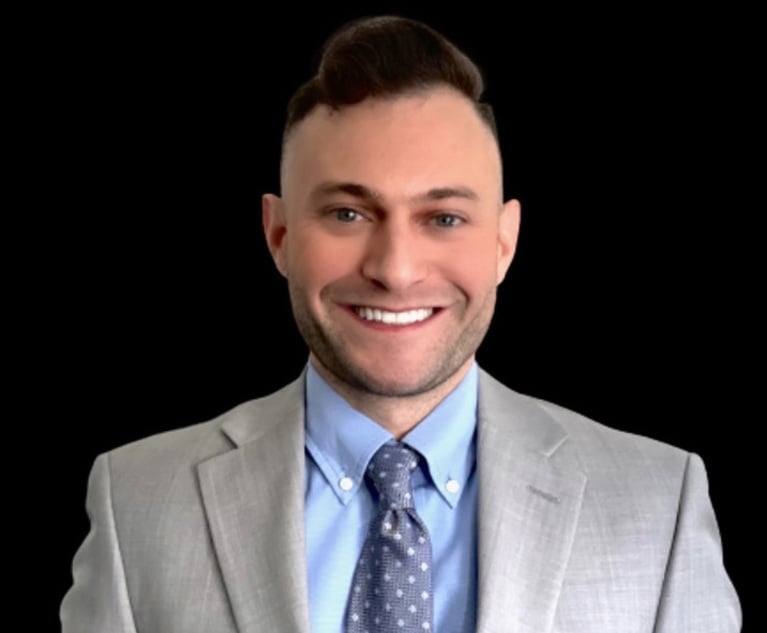How a Labor Defense Lawyer and #MeToo Won $1.5M for PBS
"With the backdrop of the #MeToo movement, and PBS's unyielding commitment to stand up for what was right, the case was so much more than the interpretation of contracts," said Morgan, Lewis & Bockius partner Grace Speights.
March 05, 2020 at 08:02 PM
4 minute read
 Grace Speights, partner with Morgan, Lewis & Bockius in Washington, D.C. Photo: Diego M. Radzinschi/ALM
Grace Speights, partner with Morgan, Lewis & Bockius in Washington, D.C. Photo: Diego M. Radzinschi/ALM
It was a trial to remember for Morgan, Lewis & Bockius partner Grace Speights, lead defense attorney for PBS against Tavis Smiley—and not just because she defeated a million-dollar labor and employment claim against her client in a high-profile case.
She also won a million and a half—and she did it with a hundred-year-old movie morals contract clause that no one seems to remember ever using before.
"This was a landmark case, both in terms of the precedent-setting nature of testing the morals clause in contracts before a jury, and by the fact that our client was the one being sued by someone accused of sexual misconduct," Speights told the National Law Journal by email Thursday as she flew to the West Coast for a client meeting.
But she'll be back in Washington before D.C. Superior Court Judge Yvonne Williams for a status conference next Wednesday to discuss what to do now. The $1.486 million the jury awarded Wednesday wasn't the end of the story. There will be the matter of attorney fees.
Smiley's lawyers plan to appeal.
"We are disappointed in the jury's verdict but respect the process," said Smiley attorney John K. Rubiner of Barton, Klugman & Oetting in Los Angeles. "We are planning to appeal based on a variety of issues that were raised in pretrial and trial rulings."
Smiley's team also included Harvard Law School professor Ronald S. Sullivan Jr. and Jeffrey D. Robinson of Lewis Baach Kaufmann Middlemiss in Washington. They were up against more than just Speights and her team, which included W. Brad Nes, Amanda B. Robinson and Elliott Brown.
The entire #MeToo movement informed the trial, embodied by the six women who testified by video deposition that Smiley—their boss—made sexual demands on them or subjected them to lewd jokes.
Smiley denied the charges, calling them all lies, and saying sexual relationships he had with the women were consensual, according to published reports. He also said his sexual jokes were innocent and not intended to offend.
But the women won the day with the jury. "This wasn't just 'he said, she said,' " wrote Washington Post reporter Keith Alexander, quoting one of the 10 men on the jury. "This was 'he said, she said, she said, she said, she said, she said, she said.' "
The story started in 2017 at the height of the #MeToo movement. PBS fired Smiley—and another host, Charlie Rose—after investigating a series of employee complaints of sexual harassment. Smiley sued PBS for breach of contract, demanding $1 million he said he should have been paid. PBS countersued, saying he had been paid for shows he didn't produce. Ultimately, PBS alleged Smiley's conduct violated the contract's morals clause, which prohibits on-air talent from participating in behavior that would negatively affect the network's reputation.
"Over the course of two years, we were able to get several aspects of the case dismissed, so what came before the jury were contract claims by both sides," Speights said. "But with the backdrop of the #MeToo movement, and PBS's unyielding commitment to stand up for what was right, the case was so much more than the interpretation of contracts."
In addition to being the global head of the Morgan Lewis labor and employment practice group, Speights is a member of the firm's cross-disciplinary crisis management practice team. "Morgan Lewis has always recognized the importance of employing a strategic and business-focused approach to addressing client matters," she said. "My team on this case each brought their own unique and complementary trial skills to the table to mitigate the long-term public relations impact of such a high-profile case."
The end result will affect far more than this case, according to Speights.
"PBS stood up for the women who were brave enough to share their stories and went to tremendous lengths to protect its hard-earned brand and reputation for public trust," Speights said. "Ultimately the case has given employers another tool in their arsenal to ensure a safe and respectful workplace culture."
This content has been archived. It is available through our partners, LexisNexis® and Bloomberg Law.
To view this content, please continue to their sites.
Not a Lexis Subscriber?
Subscribe Now
Not a Bloomberg Law Subscriber?
Subscribe Now
NOT FOR REPRINT
© 2025 ALM Global, LLC, All Rights Reserved. Request academic re-use from www.copyright.com. All other uses, submit a request to [email protected]. For more information visit Asset & Logo Licensing.
You Might Like
View All
SEC Puts Beat Down on Ex-Wrestling CEO Vince McMahon for Not Reporting Settlements
3 minute read
'The Tobacco Industry of This Decade': Slew of Class Actions Accuse DraftKings of Creating Addicts
5 minute read
Just Ahead of Oral Argument, Fubo Settles Antitrust Case with Disney, Fox, Warner Bros.

'Pull Back the Curtain': Ex-NFL Players Seek Discovery in Lawsuit Over League's Disability Plan
Law Firms Mentioned
Trending Stories
Who Got The Work
J. Brugh Lower of Gibbons has entered an appearance for industrial equipment supplier Devco Corporation in a pending trademark infringement lawsuit. The suit, accusing the defendant of selling knock-off Graco products, was filed Dec. 18 in New Jersey District Court by Rivkin Radler on behalf of Graco Inc. and Graco Minnesota. The case, assigned to U.S. District Judge Zahid N. Quraishi, is 3:24-cv-11294, Graco Inc. et al v. Devco Corporation.
Who Got The Work
Rebecca Maller-Stein and Kent A. Yalowitz of Arnold & Porter Kaye Scholer have entered their appearances for Hanaco Venture Capital and its executives, Lior Prosor and David Frankel, in a pending securities lawsuit. The action, filed on Dec. 24 in New York Southern District Court by Zell, Aron & Co. on behalf of Goldeneye Advisors, accuses the defendants of negligently and fraudulently managing the plaintiff's $1 million investment. The case, assigned to U.S. District Judge Vernon S. Broderick, is 1:24-cv-09918, Goldeneye Advisors, LLC v. Hanaco Venture Capital, Ltd. et al.
Who Got The Work
Attorneys from A&O Shearman has stepped in as defense counsel for Toronto-Dominion Bank and other defendants in a pending securities class action. The suit, filed Dec. 11 in New York Southern District Court by Bleichmar Fonti & Auld, accuses the defendants of concealing the bank's 'pervasive' deficiencies in regards to its compliance with the Bank Secrecy Act and the quality of its anti-money laundering controls. The case, assigned to U.S. District Judge Arun Subramanian, is 1:24-cv-09445, Gonzalez v. The Toronto-Dominion Bank et al.
Who Got The Work
Crown Castle International, a Pennsylvania company providing shared communications infrastructure, has turned to Luke D. Wolf of Gordon Rees Scully Mansukhani to fend off a pending breach-of-contract lawsuit. The court action, filed Nov. 25 in Michigan Eastern District Court by Hooper Hathaway PC on behalf of The Town Residences LLC, accuses Crown Castle of failing to transfer approximately $30,000 in utility payments from T-Mobile in breach of a roof-top lease and assignment agreement. The case, assigned to U.S. District Judge Susan K. Declercq, is 2:24-cv-13131, The Town Residences LLC v. T-Mobile US, Inc. et al.
Who Got The Work
Wilfred P. Coronato and Daniel M. Schwartz of McCarter & English have stepped in as defense counsel to Electrolux Home Products Inc. in a pending product liability lawsuit. The court action, filed Nov. 26 in New York Eastern District Court by Poulos Lopiccolo PC and Nagel Rice LLP on behalf of David Stern, alleges that the defendant's refrigerators’ drawers and shelving repeatedly break and fall apart within months after purchase. The case, assigned to U.S. District Judge Joan M. Azrack, is 2:24-cv-08204, Stern v. Electrolux Home Products, Inc.
Featured Firms
Law Offices of Gary Martin Hays & Associates, P.C.
(470) 294-1674
Law Offices of Mark E. Salomone
(857) 444-6468
Smith & Hassler
(713) 739-1250








